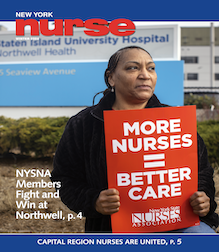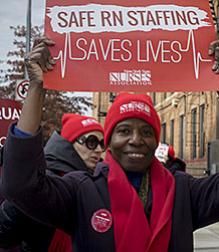The threat to our public hospitals
Wall Street and a shadowy network of right-wing politicians want to privatize services and deregulate care in our hospitals – for one reason: money.
New York is the only state in the union that prevents for-profit publicly traded companies from running hospitals. Wall Street firms and out-of-state for-profit hospital chains are out to change that. Their success would put our public hospital system – and our mission of caring for every New Yorker – at grave risk.
Here’s their game plan, and ours to stop them.
Corporate takeover step #1: Deregulate
In New York State, the Certificate of Need (CON) process gives patients and community members a voice when hospital administrators want to open or close units, or to add new services.
CON blocks for-profit companies from operating our hospitals. But its main purpose is to prevent unnecessary and wasteful hospital spending and to ensure that New Yorkers have access to quality care where they live.
It doesn’t always work as it should, but the Certificate of Need process is still a powerful protection for patients and caregivers. It’s a tool we use to demand that the state and HHC keep their commitment to the people of New York.
This process is in danger.
In 2009, a secretive think tank, the American Legislative Exchange Council (ALEC), drafted model legislation to gut New York’s Certificate of Need regulation. Large corporations and anti-union billionaires like the Koch brothers fund ALEC, and they use it to push for laws that will help make the rich even richer. According to The Center for Media and Democracy, “Through ALEC, behind closed doors, corporations hand state legislators the changes to the law they desire that directly benefit their bottom line.”
Step by step, corporate forces are gaining ground in healthcare in our state: Last fall, the New York State Dept. of Health’s planning committee approved dramatic reductions to the scope of the Certificate of Need review process. These changes still have to be reviewed by the state and written into state regulations, but if they go through, they will mean more power for big hospital chains.
Fewer limits on CON would give large private hospitals greater incentive to poach patients with better insurance from our public hospital system – leaving public hospitals with fewer and fewer resources to meet our mission of caring for every patient who comes to us in need. Fewer limits on CON would also weaken the levee keeping for-profits out of hospitals in New York.
Corporate takeover step #2: Pilot projects
Out-of-state for-profit chains know they can’t take over our hospitals all at once. Their next tactic: pilot programs.
During the last legislative session in Albany, lawmakers proposed at least three different “pilot” programs that would have allowed for-profit companies to operate New York hospitals – starting with as few as two and as many as 10 pilot hospitals.
They used real crises in healthcare in Brooklyn and upstate as their excuse to legitimate these experiments. But their long-term goal is clear: to open the floodgate and allow for-profit companies to own and operate New York hospitals.
We beat every single proposal to let for-profit companies experiment on New York patients. But they’re definitely coming back. After our victory, investment banker Stephen Berger told The New York Times, “It doesn’t mean we’re not going to find a way to work around it.”
Corporate takeover step #3: Make the market the solution
Both the Affordable Care Act (ACA) and the New York State’s MRT (Medicaid Redesign Team) reforms rely on the notion that competitive market forces will fix hospitals. But there’s no evidence that the market can deliver the affordable, quality healthcare that all people need and deserve.
For individuals, the free market idea of competition driving down costs makes no sense when it comes to healthcare. It’s not just that people can’t comparison shop when they’re sick: When it comes to healthcare, costs are not transparent. Most of the time, it’s impossible to figure out what something costs. Moreover, in an emergency, cost is not on a patient’s mind – time and proximity are of the essence. Similarly, effective preventive care depends first and foremost on access. People can’t and don’t travel great distances to get care that costs less.
The free market doesn’t work to drive down costs for healthcare institutions either. The Affordable Care Act actually creates incentives for hospitals to merge and consolidate. That by itself will undermine the very competition that the free market theory rests on.
The push for primary care and preventive care effectively unlocks new sources of revenue that for-profit companies will pursue. They will open facilities to make money providing all manner of health services. And bundled, or episode-based, payments for care will create incentives to provide less of the very care they are intended to spawn. The fiasco in dialysis treatment (see page 11) already illustrates this all too clearly.
The profit motive skews the fundamental purpose of hospitals. For corporations, the results have turned some hospitals into “enormous profit centers,” according to Forbes. For people, the results have been a disaster. Nurses get laid off. Staffing gets worse. Wait times go up. And public hospitals face steeper and steeper cuts.
Common folly
The “common wisdom” that the free market can cure problems in the healthcare system is flat-out wrong. The wealthy and those with top-quality health insurance can get the best wherever they are. The rest of us rely on a system that delivers for everyone: A system like New York’s HHC and other public hospitals. For-profit companies can only make profits in healthcare by denying care to less profitable patients.
As nurses, we have a duty to care for every patient, not just those with top insurance and money in their pocket. And that means we have a duty to fight to stop for-profit hospitals from taking over patient care in New York.




